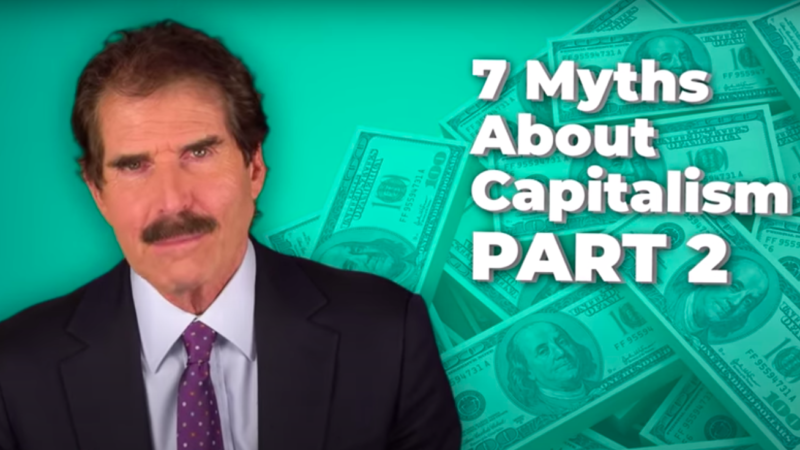What People Get Wrong About Capitalism
"We went from agricultural poverty to a country characterized by middle-class prosperity."

Last week, I debunked three myths about capitalism. Here are four more:
Myth Number Four: Capitalism creates unsafe workspaces.
"Greedy capitalists" will risk workers' lives to increase production if government, through agencies such as the Occupational Safety and Health Administration (OSHA), doesn't stop that.
It's logical to assume that government regulation saves lives. Workplace deaths dropped after the OSHA was created. Government officials like showing a graph of the decline.
But if you bother to also look at data from before the OSHA's creation, you see that deaths fell at the same rate before regulation began! Why?
"As we become richer, we become safer," says Dan Mitchell of the Center for Freedom and Prosperity.
Wealth created by capitalism lets us afford safety devices and build machines to do dangerous work. The OSHA is like someone jumping in front of a parade and claiming he led the parade.
"We need more capitalism because when people get rich, they can afford more safety!" adds Mitchell.
Myth Number Five: "Unfettered" capitalism created evil "robber barons" who got rich by "exploiting" workers and consumers.
It's true that more than 100 years ago, a few entrepreneurs, such as John D. Rockefeller, amassed a huge amount of wealth.
But Rockefeller was neither robber nor baron. He was not born rich, and he didn't rob. He got rich by offering consumers better deals.
Rockefeller developed ways to deliver oil for less. He won customers by lowering the price of kerosene from 26 cents per gallon to about 6 cents.
For the first time, average people could afford fuel for lanterns so they could read after dark. Rockefeller may have even "saved the whales" by making oil so cheap that killing whales to get whale oil was no longer practical.
His competitors hated him for cutting prices. It was they who convinced the gullible media to call Rockefeller and other entrepreneurs "robber barons."
Cornelius Vanderbilt was also born poor. At age 11, he quit school to work on boats.
Then he invented ways to make travel cheaper. He cut the New York-Hartford fare from $5 to $1.
Because of capitalists like them, Mitchell points out, "We went from agricultural poverty to a country characterized by middle-class prosperity."
Still, I'm told that even if capitalism brings us cheaper or better products, it just isn't "good for us."
That's Myth Number Six.
Of course, capitalism can breed nasty materialism. Fox News' Tucker Carlson sneers, "Does anybody believe cheaper iPhones or more Amazon deliveries of plastic garbage from China will make us happy?"
Mitchell responds, "We're not buying iPhones and plastic garbage unless we think it's better for us than the dollars that we have!"
That's a very important point. No capitalist gets our money unless we voluntarily choose to exchange it for whatever he's selling. As Mitchell puts it, "Capitalism is the only system that gives people the liberty to make their own choices."
Myth Number Seven: Capitalism's pursuit of profit drives businesses to create robots that will eventually take away most everyone's job.
It could happen. Artificial intelligence is powerful. Maybe this time is different.
But again and again, experts predicted that employment was about to decline—and again and again, they've been wrong.
Some people do lose jobs. Capitalism promotes creative destruction.
It's terrible for the fired employee.
But it's good for most everyone else. It's what allows for innovation.
Mitchell points out, "The computer destroyed the typewriter builder's job, electricity took candlemakers' jobs," but those jobs were soon replaced with better ones.
Capitalism has continually generated more jobs. When America began, 90 percent of workers worked on farms. Now fewer than 2 percent do. And there are millions more of us.
"As long as our economy has the dynamism that free markets allow," says Mitchell, "we're going to see more job creation and higher income levels. That's what makes the children and grandchildren of typewriter makers so much better off. No other system anywhere in the world has ever come close to capitalism's ability to generate mass prosperity."
COPYRIGHT 2021 BY JFS PRODUCTIONS INC.


Show Comments (107)